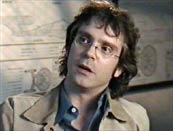Explain how real science is in writing Star Trek.
 It's very important. We've always fancied ourselves as a science based show. If we do imagine something that's somewhat fantastic, we try to back it up with science.
It's very important. We've always fancied ourselves as a science based show. If we do imagine something that's somewhat fantastic, we try to back it up with science.
I think all the writers approach stories in slightly different ways, but the way that I've always tried to approach the show is by coming up with a wacky idea. Let's just say, for instance, that the ship gets caught in a repeating loop of time. It's preposterous, it could never happen in the world that we know. But if you make it sound good, using the term 'causality loop,' and throw some interesting terms in that seem to reinforce the idea and support it, suddenly it becomes a little more scientific.
The problem that this creates, of course, is that you can never do a story and not explain what's going on. Unlike The X Files, if we have a ghost, we have to explain the scientific reason there is a ghost. We have to support everything with just a little bit of science.
It is a bit of a noose. I envy The X Files because they can just tell a weird and interesting story and not really have to explain anything, and leave it a bit of a mystery, at the end. Our show's not a mystery show, it's a show about solving mysteries.
